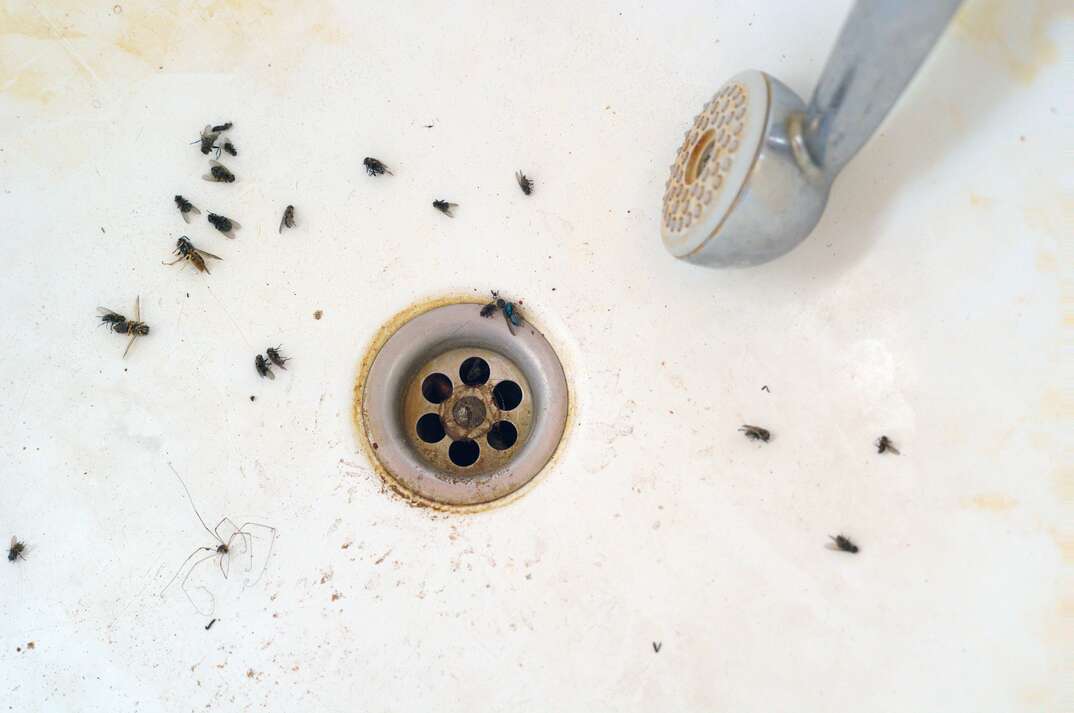- AppliancesElectriciansHVACLandscapingLocksmithPest ControlPlumbingRenovationRoofingT V RepairAll Home Improvement
- Car AccidentClass ActionCorporate LawCriminal DefenseDivorce LawEmployment LawFamily LawFinancial LawLegal AidMedical Injury LawyersMedical MalpracticeReal Estate LawWater Fire RestorationAll Legal
- InvestmentRetirementAll Finance
- Animal InsuranceAutoGeneral InsuranceHealth PolicyHome RentersAll Insurance
- DentalHealth SpecialistsAll Medical
- Animal CareVeterinaryAll Pets
- Auto GlassTowingAll Automotive
What Are Drain Flies — And How Do You Get Rid of Them?

Turning on your faucet, only to be met by a burst of little black flies, is never a pleasant surprise. If you're wondering what on earth these pesky critters could be, chances are you've been hit with a drain fly infestation.
Read More Pest Control Articles
Drain flies are common household pests that thrive in wet environments. These insects don't bite or sting, but they're capable of multiplying rapidly, and most people just don't want them hanging (or buzzing) around.
As their name says, drain flies are tiny insects that live and breed inside plumbing pipes and drains. The scientific name for drain fly is Psychodidae, and they're also known as sewer gnats and sink flies. While they're not considered as harmful as parasitic insects, such as horse flies, drain flies may trigger allergic reactions in sensitive people.
The most telltale sign of a drain fly infestation is the presence of small, winged insects flying around your sink drains. The flies are also attracted to standing water, drain clogs and refrigerated drain pans. Musty odors are another common indicator of a drain fly infestation.
If you're concerned about a possible drain fly infestation, try the tape test method: Place a piece of waterproof duct tape over the suspected drain and leave it sealed overnight. Drain flies attempting to flee your drains should stick to the tape.
How Do They Get Into Your Drains?
Drain flies are drawn to standing, stagnant water and organic matter, such as kitchen grease and food scraps. They enter homes and structures through window gaps, basements and plumbing systems. Female drain flies typically lay between 30 and 100 eggs, and the eggs hatch within 48 hours. After hatching, the larvae grow into adult drain flies within nine to 15 days.
More Related Articles:
- What to Look For When Hiring an Exterminator
- Are Pest Control Products Dangerous For Kids and Pets?
- What Are Ultrasonic Pest Repellers?
- 10 Ways to Prevent Termites
- How to Spray for Mosquitoes
While these tiny flies can definitely get on your nerves, they're actually quite easy to get rid of with simple over-the-counter solutions and home remedies. Follow some of these easy tips to eliminate drain flies for good:
- Thoroughly clean your drains. In some cases, a good drain scrubbing may be all that's needed to send drain flies on their way. Use a metal pipe brush and scrub every reachable nook, cranny and corner in your drain. After you're finished scrubbing, pour hot water down the drains to flush away any remaining debris.
- Use a store-bought drain cleaner with natural enzymes. Drain-cleaning solutions containing natural enzymes and helpful bacteria work well to eliminate grease, food particles and other types of organic waste. Because drain flies feed on the organic waste in your drain, taking away their food source should also help prevent them from reproducing.
- Try salt, vinegar and baking soda: Mix 1/2 cup salt and 1/2 cup baking soda with a cup of vinegar. Pour the mixture down the affected drain and allow it to sit overnight. In the morning, pour hot water down the drain to eliminate the drain flies. If you notice some stragglers, repeat the process.
If these remedies aren't effective or the flies return shortly after you've treated the affected areas, you may want to call in a professional pest control specialist.
Preventive Methods
Once you've eliminated your drain fly infestation, it's important to take some proactive steps to prevent their return. Here are some helpful preventive methods to keep drain flies away:
- Keep your drains clean and free of debris. Pouring hot water down your drains once a week can help loosen food particles and grease, eliminating the drain flies' food source.
- Use drain covers. Placing drain covers over your kitchen and bathroom sink drains when not in use is an easy way to prevent drain flies from entering your plumbing system.
- Eliminate sources of standing water. In addition to organic food scraps and grease, drain flies are drawn to the bacteria that can build up in standing or stagnant water. Removing standing water sources from drain pans, hot water appliances and water pitchers can help prevent drain flies from breeding and multiplying.
- Stay on top of plumbing issues. Plumbing blockages and broken pipes are common breeding grounds for drain flies. Be sure to address any and all plumbing issues that pop up to keep these unwelcome critters out of your drains.
Elocal Editorial Content is for educational and entertainment purposes only. Editorial Content should not be used as a substitute for advice from a licensed professional in your state reviewing your issue. Systems, equipment, issues and circumstances vary. Follow the manufacturer's safety precautions. The opinions, beliefs and viewpoints expressed by the eLocal Editorial Team and other third-party content providers do not necessarily reflect the opinions, beliefs and viewpoints of eLocal or its affiliate companies. Use of the Blog is subject to the
Website Terms and Conditions.The eLocal Editorial Team operates independently of eLocal USA's marketing and sales decisions.



